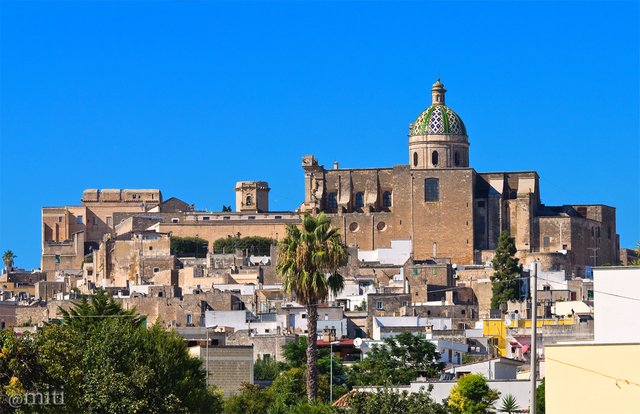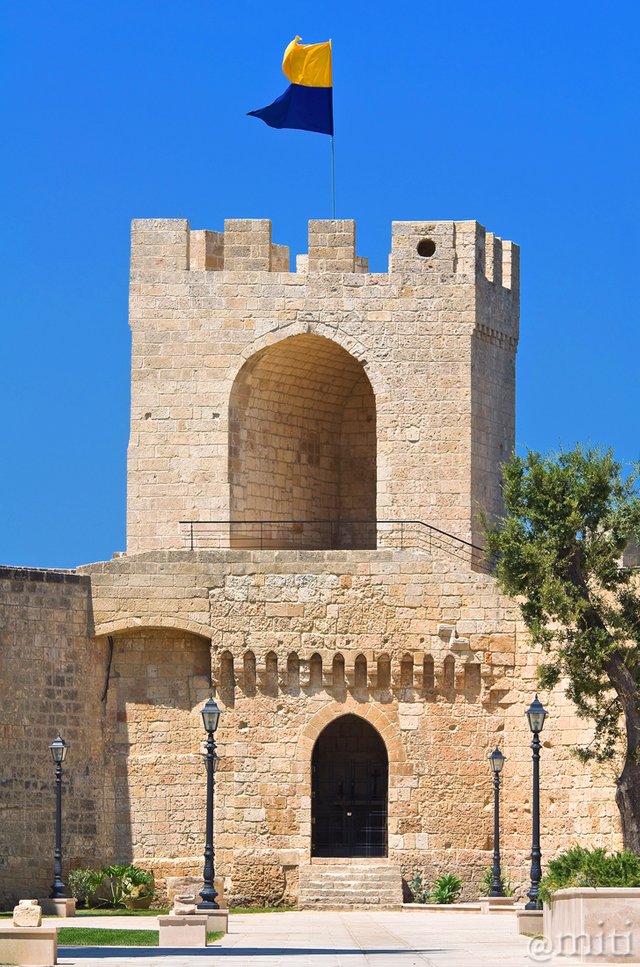A Journey through Italy: one photo every day #73 - ORIA [ENG/ITA]

A panoramic view of Oria (Author's photo - All rights reserved)
Vista panoramica di Oria (Immagine dell'autore - tutti i diritti sono riservati)



Ciao a tutti,
questo è un viaggio attraverso l'Italia. Posterò una foto al giorno con una brevissima descrizione. Spero vi piaccia!

Oria è un piccolo borgo della provincia di Brindisi, nella regione italiana meridionale della Puglia. Si trova sulle alture più elevate di un cordone collinare di antiche dune fossili nel nord del Salento, che conferiscono una posizione dominante sulle pianure circostanti della penisola.
È stata insignita della Bandiera Arancione (riconoscimento per i borghi significativi dal punto di vista culturale).
Le origini di Oria risalgono al 1200 aC quando un gruppo di cretesi di Minosse, spinto da una tempesta sulla costa ionica della Puglia, fondò la città di Hyria, ora chiamata Oria.
L'antica Oria fu un importante centro durante la dominazione romana. La città aveva, infatti, un ruolo strategico grazie alla sua posizione lungo la via Appia tra le due importanti città di Brindisi e Taranto.
Dopo la caduta dell'Impero Romano d'Occidente, Oria fu proprietà dei Greci, dei Longobardi e dei Bizantini.
Nel 977 fu conquistata dai Normanni e successivamente dagli Svevi.
Tra il 1225 e il 1233, l'imperatore Federico II fece costruire un castello sugli elementi dell'acropoli normanna e provvide a consolidare le opere difensive della città. Successivamente al periodo svevo, Oria passò sotto il dominio degli Angioini e degli Spagnoli.
Oria è divisa in quattro quartieri. Il rione Castello (quartiere del castello) contiene il Castello; tra le sue impressionanti mura ci sono tre torri: la Torre Quadrata, parte del complesso originale Sveviano, la Torre del Cavaliere e la Torre del Salto, risalenti al periodo angioino.
Il rione Giudea era abitato da ebrei, il rione Lama è in pianura in cui scorreva l'acqua delle zone più alte della città. Il rione San Basilio, invece, si trova su una collina dove il Santo costruì la prima chiesa di culto greco ad Oria.
Il luogo di culto che racconta la storia di Oria è la cattedrale dedicata alla Madonna Assunta.
L'edificio richiama pesantemente le forme della famosa Basilica di San Pietro. È una chiesa in stile barocco con una facciata fatta con le pietre di carparo locali.
A sinistra della chiesa c'è la torre dell'orologio e proprio dietro il campanile. Al centro si può ammirare una bellissima cupola policroma.
La processione storica di Federico II è una delle più importanti rievocazioni medievali del periodo federiciano durante la quale quattrocento persone si vestono in costume d'epoca e sfilano lungo le vie principali della città impreziosite per l'occasione con bandiere colorate dei quattro quartieri.
Cosa vedere: il centro storico, il Castello, la Cattedrale di Maria SS Assunta in Cielo, il Museo Archeologico Messapico, l'Area Archeologica di Piazza Lorch, il Parco di Montalbano, la Chiesa di San Domenico, la Chiesa di San Francesco d'Assisi, la Chiesa di San Francesco da Paola, la Chiesa di San Giovanni Battista, la Chiesa della Madonna della Scala, il Palazzo Vescovile, il Palazzo del Sedile.

Hello everyone,
I began a Photo Journey through Italy. I will post one photo every day with a little note of explanation. I hope you like it!

Oria is a small town in the province of Brindisi, in the Southern Italian region of Puglia. It is placed on the most elevated heights of a cordon hills of ancient fossil dunes in the north of the Salento, which confer a dominant position on the surrounding plains of the peninsula. It was awarded the Orange Flag (an Italian prize given to hamlets significant from a cultural point of view).
Oria origins go back to 1200 BC when a group of Cretans from Minos, beaten by a storm on the Ionian coast of Puglia, founded the city of Hyria, now called Oria.
Ancient Oria was an important centre during the Roman rule. The city had, in fact, a strategic role thanks to its location along the Appian Way between the two important towns of Brindisi and Taranto. After the fall of the Western Roman Empire Oria was owned by the Greeks, the Lombards and the Byzantines.
In 977 it was conquered by the Normans and subsequently by the Swabians. Between 1225 and 1233, the Emperor Frederick II made build a castle on the elements of the acropolis of Norman and provident to consolidate the defensive works of the city. Subsequently to the Swabian period, Oria passed under the dominion of the Angevins and Spaniards.
Oria is divided into four districts. The rione Castello (Castle district) contains the Castle; among its impressive walls there are three towers: Torre Quadrata (Square Tower), part of the original Svevian complex, Torre Del Cavaliere (Knight Tower) and Torre Del Salto, dating back to the Angevin period. The rione Judea was inhabited by Jewish, the rione Lama is on the flatland into which the water of the highest areas of the town flowed. The rione San Basilio, instead, is located on a hill where the Saint built the first Greek rite church in Oria.
The place of worship that tells the better the history of Oria is the Basilica Cathedral dedicated to Our Lady of the Assumption. The building draws heavily the shapes of the famous Basilica di San Pietro. It is a baroque style church with a facade made with the local carparo stones. On the left of the Church is the clock tower and just behind it the bell tower. In the center a beautiful polychrome dome can be admired.
The historical procession of Frederick II is one of the most important medieval reenactments of Frederick period during which four hundred people dressed in period costume parade along the main streets of the city embellished for the occasion with colorful flags of the four districts.
Thing to see: the Historic center, the Castle, the Basilica Cathedral of Our Lady of the Assumption, The Messapian Archaeological Museum, Archaeological Area of Piazza Lorch, Montalbano Park, the Church of San Domenico, the Church of San Francesco d'Assisi, the Church of San Francesco da Paola, the Church of San Giovanni Battista, the Grotto church of Madonna della Scala, the Bishop's Palace, The Sedile Palace.

| Tipo di foto / Category | Paesaggio / Landscape view |
| Esposizione / Settings | 1/320 sec, ISO 200, f/10 |
| Camera | Nikon D5000 |
| Lente / Lens | Tamron SP AF 70-200mm f/2.8 Di LD (IF) |
| Filtro / Filter | Polarizzatore Hoya / Hoya Polarizing filter |
| Cavalletto / Tripod | Manfrotto MKC3-P01 |
| Località / Location | Oria (Brindisi), Italia |
| Software | Photoshop |


The Castle of Oria (Author's photo - All rights reserved)
Il Castello di Oria (Immagine dell'autore - tutti i diritti sono riservati)
Giusto ieri sera ho pianificiato il mio prossimo viaggio in auto all'aeroporto del Salento: se arriverò con un paio d'ore d'anticipo, grazie al tuo post, ora so cosa visitare. :-)
L'alternativa che mi attira assai (e ancor più sul mio percorso) è Ostuni... rientra nel tuo viaggio attraverso l'Italia, @miti?
Infinite grazie, Carlo!
Un caro abbraccio da @amico!
Ciao caro, Se devo darti un consiglio spassionato, metti Ostuni sopra tutte le altre mete. E' un posto straordinariamente bello, ricco di storia nonchè grande meta turistica. Ho tantissime foto di Ostuni ma non l'ho ancora inserito nel mio percorso "A Journey through Italy: one photo every day" perchè trovo che sia troppo riduttivo parlare di Ostuni con un post di questo tipo, sia dal punto di vista fotografico che descrittivo.
Messaggio ricevuto forte e chiaro!
Grazie mille, Carlo! ;)
Italy is the country l like most in Europe. Has history, art, opera, good food, beautiful lanscapes , a lot of world heritages........very worth to travel around and have holiday at the Amalfi coast....... thanks for sharing your artical.
I agree and Amalfi coast definitely worth a visit.
@miti This is a very spectacular panaromic view of this fort.
Can you please tell us how much old this fort is??
It is written in the post, anyway it was built between 1225 and 1233 by the Emperor Frederick II
OMG!!! Its 785 years old and still its looks so beautiful.
Well maintained by the government. Waiting for more such amazing pics from you @miti
Italy is a great country for travelers.
Yes, that's true.
Thanks for Your Explaination of Your Journey Of Italy such a great way...
You're welcome.
Bella cupola La città sembra calda. Adoro la foto della torre del castello di Oria. :)
Ciao, è una cupola policroma che assume diverse colorazioni a seconda di come la luce la colpisce.
Congratulations, Your Post Has Been Added To The Steemit Worldmap!
Author link: http://steemitworldmap.com?author=miti
Post link: http://steemitworldmap.com?post=a-journey-through-italy-one-photo-every-day-73-oria-eng-ita
Want to have your post on the map too?
Italy always in my heart I love it so much thank you for sharing this post
You're welcome.
tenemos tantos lugares magnificos en el mundo llenos de historia y belleza y una vida tan corta para poder conocer cada uno, post como estos nos dan la oportunidad de conocer aquello que ni imaginabamos que exitia :)
That's a beautiful thought, I agree.
Mai stata a Brindisi ma Oria sembra un posto grazioso.
Ciao, si è un posto ricco di storia e se si è in zona secondo me merita sicuramente una visita.